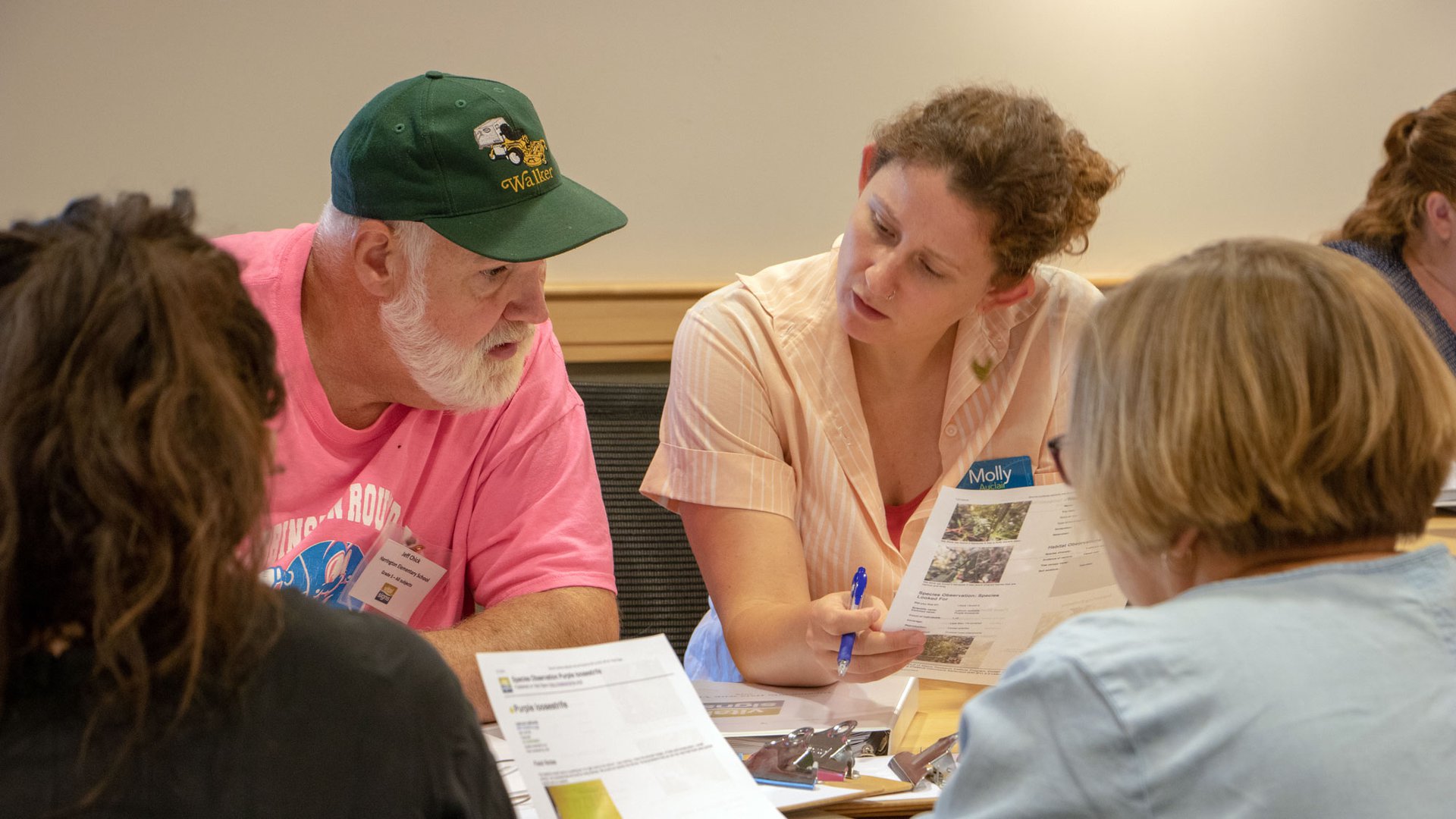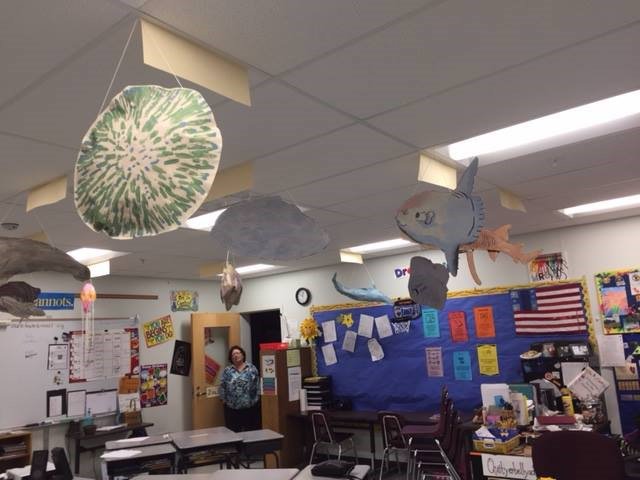Recognizing Maine Teachers
Announcements | Dec 31, 2018
In 2018, we recognized the contributions of two hardworking Maine teachers. Learn more about their accomplishments and classrooms.

Honoring Excellence
In April, we honored Buckfield Junior/Senior High School teacher Gretchen Kimball with the fifth annual McCarthy Education Innovation Award. GMRI education staff presented the award during a ceremony at the Maine Science Teachers Association conference.
Each year, we present the McCarthy award to the Maine teacher who best embodies GMRI education principles. These teachers provide students authentic science experiences and promote students’ interest in, understanding of, and connection to scientific studies. The McCarthy Award is named after retired Unum CEO Kevin McCarthy, a longtime supporter of science education in Maine.
Kimball was recognized by her nominator as a true innovator in the classroom, and she’s known for creating authentic learning experiences for her students. This year, she took on the challenge of adapting her physical and chemical science units to be less "by-the-book" and more relevant to questions that her students and their families deal with (efficient home heating, more biodegradable plastics, etc.).
Each year, GMRI presents the McCarthy award to the Maine teacher who best embodies GMRI’s education principles.

“Gretchen is a leader,” says Professional Development Coordinator Molly Auclair, who works closely with Kimball and other Maine teachers. “She’s always enthusiastically sharing what she is trying out, how it goes, and her reflections. She communicates freely with other teachers in a collaborative and constructive way.”
GMRI staff also noted Kimball’s commitment to professional development, and support of other teachers. In the last two years, she has utilized our citizen science education tools and made valuable contributions to the Western Maine Regional Teacher Community — a partner effort between GMRI and local teachers to connect rural and under-resourced teachers of STEM (science, technology, engineering, and math) subjects.
“Teachers like Gretchen Kimball are a huge part of what makes GMRI education programs scale to serve statewide needs. We’re so glad to present her with this award, and we’re excited to continue our shared efforts.”
Leigh Peake Chief Education Officer![]() Leigh Peake Chief Education Officer
Leigh Peake Chief Education Officer
Read More in the Sun Journal
Buckfield teacher receives McCarthy Education Innovation Award
Lewiston Sun Journal|Jul 14, 2018
Teacher Tales
For over a decade, 5th- and 6th-graders from all corners of Maine have come to the Gulf of Maine Research Institute for our LabVenture education program. During their visits, the students take on the role of scientists and conduct their own hands-on research in the Cohen Center for Interactive Learning, our state-of-the-art learning laboratory.
But the LabVenture experience lasts far beyond one day in the lab. We work with teachers across the state to help them incorporate the lessons of LabVenture in their classrooms. Many teachers participate in our workshops and work with curriculum we’ve developed — but some go even further. Here's a story of how one teacher is doing just that.
Meet Ms. Flick
Before and after their visit to LabVenture, the kids from Greene Central School are immersed in learning about the Gulf of Maine. Although the school is just one hour away from our lab — and around 45 minutes away from the nearest slice of beach — many of Nancy Flick’s students have never been to the ocean.
“We live so close to the coast, but it never ceases to amaze me: so many of our students have never been to the ocean,” Flick says. “I think that art and technology add interest and commitment to their learning and research. I have always felt that if a student can see it, touch it, smell it, taste it, and build it, then they have learned it for life.”
That perspective has driven Ms. Flick to craft a complete interdisciplinary experience for her students to fully understand the complexity of this great ecosystem.
Writing, Communicating, and Presenting
First, Ms. Flick puts the name of Gulf of Maine animals and plants in a fishbowl. Each student picks a unique species to learn about over the course of the unit. Students write a research paper on their species, in collaboration with their English teacher. As they conduct their research, they are expected to write down ten facts that are "knock-your-socks-off interesting" to use in a slide show. They add pictures to illustrate the facts in PowerPoint, which they use to share what they learned from their research. They present to all the other classrooms, and to their families and friends at a family night. Even during spelling lessons, they learn about the Gulf of Maine as they practice important words about this ecosystem.
Hands-on Learning: Dissections, Art, and Cooking!
Later in the unit, each student gets a squid to dissect. They examine the skin under microscopes to look at the chromatophores and see how a squid changes colors. After the dissection, Ms. Flick invites parents to come and help prepare and cook calamari for the class. Together, they create a display of the many kinds of food the Gulf of Maine produces. Ms. Flick even brings in kelp products for them to taste. The students also paint murals throughout the room, including all their species to scale, the zones of the ocean, and other animals in their home habitats. They also paint the Portland Headlight and sometimes a beach scene, lobster boats, and scallop draggers. After they finish painting, each student makes a colorful paper 3D model of their species to hang from the classroom ceiling.
Ocean artwork hangs from the ceiling of Ms. Flick's classroom.

Considering Community
Ms. Flick's students learn about the many ways that humans use and interact with the Gulf of Maine. Her class discusses fisheries management concepts, such as legal limits and closed seasons. They talk about the motivation for closures and all the people who feel the associated economic impacts. The class talks about all the students and people who live in Maine's island communities, and what travel to work and school means to them. They learn about jobs that are available along the coast and learn more about the economic opportunities provided by fishing, clamming, scallop dragging, and sea farms.
The watershed is also a big part of what makes the Gulf of Maine special. A local well-water testing business speaks to Ms. Flick’s class about clean water, and how the watershed affects the health of our rivers and, eventually, the ocean. In the past, her class has taken the ferry out of Portland to Peaks Island to drop “letters in a bottle” in the outgoing tide. Later, they looked at the ocean currents and try to guess where their bottles would end up. Of course, they learned how these currents affect weather and climate around the world.
Earning Praise
Ms. Flick has created an incredible moment in her students’ education. They dive deep into the Gulf of Maine through their classrooms, with their families, at our lab, and in the community. It’s no surprise that Ms. Flick gets a lot of praise around the school.
“The entire project is such a favorite of students, that even our kindergarteners tell me that they can’t wait to learn more about the Gulf when they get to sixth grade,” said a fellow teacher. “When the students visit the lab, it brings all they learned to life. They get to see how everything is interrelated and how we are so connected to our Gulf.”
-
![Gulf of Maine Warming Update: Spring 2024]()
Gulf of Maine Warming Update: Spring 2024
Over the past decade, scientists have led a body of research that highlights the rapid pace of warming in the Gulf of Maine. To help …
Reports
-
![Gulf of Maine, Explained: Tracking Ocean Conditions]()
Gulf of Maine, Explained: Tracking Ocean Conditions
GMRI Senior Program Manager, and leader of our Ocean Data Products team, Riley Young-Morse explains how she uses deep water buoys to collect data on …
Gulf of Maine, Explained
-
![Gulf of Maine, Explained: Environmental DNA (eDNA)]()
Gulf of Maine, Explained: Environmental DNA (eDNA)
GMRI Research Scientist Dr. Graham Sherwood, who leads our Fisheries Ecology Lab, explains how environmental DNA (eDNA) can help us study fish populations in the …
Gulf of Maine, Explained
-
![Gulf of Maine, Explained: Species Distribution Modeling]()
Gulf of Maine, Explained: Species Distribution Modeling
GMRI Quantitative Research Associate Dr. Andrew Allyn talks about how scientists use computer models to understand where fish are in the Gulf of Maine, and …
Gulf of Maine, Explained




